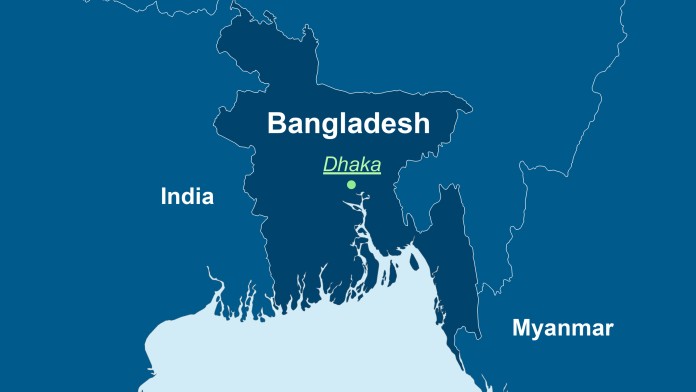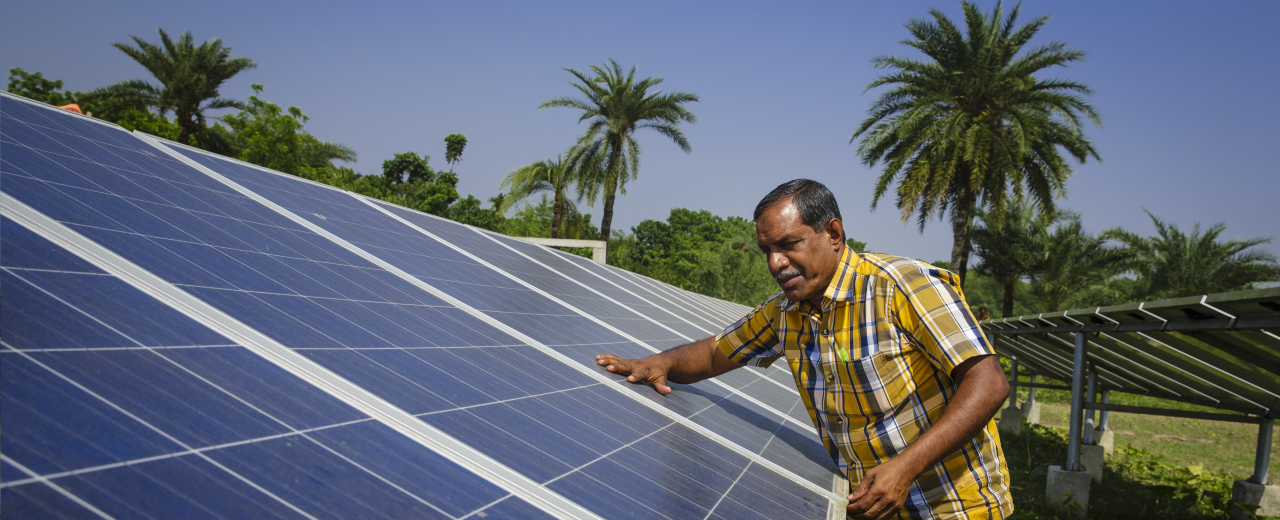
As of: 03/2025
Bangladesh has hugely increased the population’s electricity supply: in 2010, only half of households were connected to the power grid, but today every family has access to electricity. However, the supply is still not reliable and sufficient. The country continues to struggle with power outages. The transitional government, which has been in office since 2024, is also placing a recognizably greater focus on renewable energies. KfW, commissioned by the German Federal Government, is supporting Bangladesh in this process and is providing funds for solar parks, solar rooftop panels, solar-powered pumps for irrigation and biogas plants.
Bangladesh has made great strides in energy production in recent years. It has succeeded in tripling its power generation capacity in the last ten years. However, the process of expanding renewable energy production is still in its infancy. In addition, in rural areas, where the majority of the population lives, there is still a lack of sufficient and reliable electricity supply.
Businesses often suffer from power cuts, sometimes on a daily basis. This hinders production and results in lost sales. At the same time, the current transitional government is focusing on continuous economic growth. Bangladesh’s energy demand is therefore expected to increase further in the coming years.
Since its independence in 1971, Bangladesh has relied primarily on local natural gas supplies for its energy supply, but these are diminishing. Dependence on climate-damaging and expensive imported fossil fuels is increasing. Although the fossil fuels natural gas, oil and coal will remain the most important energy sources in the medium term, the current transitional government is working hard to expand electricity generation from renewable energy sources in order to
Bangladesh is one of the most densely populated countries in the world. Land is therefore a scarce and expensive commodity. Around 77% of the surface area of Bangladesh is used for agriculture. People depend on the land to produce food and secure an income. In view of the scarcity of land, rooftops offer a great deal of potential for a socially compatible expansion of solar energy.

Commissioned by the German Federal Government, KfW is providing funds for solar and biogas systems, as well as commercial solar parks. The aim of the first phase of the project is to attract companies to install solar panels on their roofs. This sustainably generated electricity will benefit the entire population when it is fed into the grid. Where connection to the grid is not possible, solar power will be used locally. In many places, diesel-powered irrigation pumps will be replaced by solar-powered pumps. Domestic biogas plants allow households with more than two cows to produce clean gas. Commercial biogas plants can be used for both gas production and power generation. The second phase of the programme will primarily finance commercial solar parks that feed electricity into the grid.
KfW is cooperating in the projects with the Infrastructure Development Company Limited (IDCOL), a public-sector financial institution (non-bank). As part of the first phase, IDCOL receives a low-interest loan of EUR 60 million, which is used to provide loans for the first commercial solar rooftop programme in Bangladesh. IDCOL also receives a further EUR 8.5 million in grants to subsidise financing for solar irrigation systems and biogas plants. IDCOL receives additional support with a complementary measure of EUR 1.5 million to guarantee compliance with technical, economic, social and environmental standards. This ensures that these standards are observed early on when the technology is introduced on the market. IDCOL itself will provide loans to companies, investors, non-governmental organisations and interested groups to finance renewables. An additional subsidised loan of EUR 80 million in a second phase is used to finance commercial solar parks in particular. A further 18.5 million euros are available in a third phase for investment grants, as well as 1 million euros for technical support.
With the help of the projects:
The projects will increase the expansion of renewable energies and thereby improve access to environmentally and climate-friendly electricity in Bangladesh. At the same time, they will help to make the energy supply in Bangladesh more reliable, modern and climate-friendly. Renewable energy provides cost-effective and environmentally friendly access to energy, even in areas where the national grid is not yet developed. In addition, renewable energy will replace energy sources such as diesel, which are damaging both to the environment and to human health. This will improve the population’s living conditions, strengthen the local economy and prevent greenhouse gas emissions.
The projects contribute to achieving these United Nations Sustainable Development Goals:
KfW Group
KfW Development bank
KfW Office Dhaka
kfw.dhaka@kfw.de
Share page
To share the content of this page with your network, click on one of the icons below.
Note on data protection: When you share content, your personal data is transferred to the selected network.
Data protection
Alternatively, you can also copy the short link: https://www.kfw-entwicklungsbank.de/s/enzB1T9J
Copy link Link copied